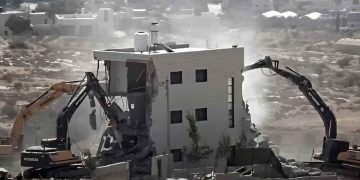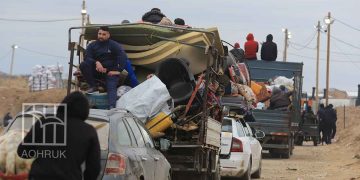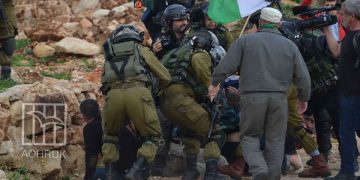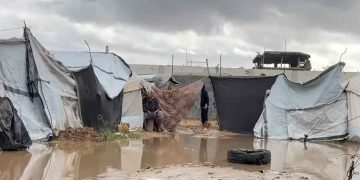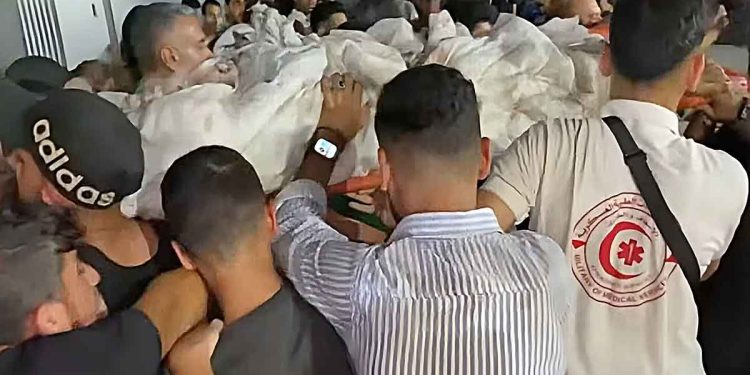Arab Organisation for Human Rights in the UK (AOHR UK) condemns the deliberate killing of Al Jazeera journalists Anas al-Sharif and Mohammed Qreiqa, photographers Ibrahim Zaher and Mohammed Nofal, and journalist Mohammed al-Khaldi, who were directly struck on 10 August 2025 outside al-Shifa Hospital in Gaza City while sheltering in a tent clearly designated for media. This was not a battlefield mistake. It is a calculated crime and a further link in a systematic policy to target the press and keep the ongoing genocide in the Gaza Strip, underway since 7 October 2023, out of the world’s sight.
AOHR UK pointed out that from the first day of the genocide, the Israeli occupation has sealed Gaza off from independent reporting: foreign media have been barred, local reporters targeted, media offices destroyed, and anyone carrying a camera or recording testimony pursued. The assassination of Anas al-Sharif epitomises this criminal policy, designed to ensure massacres, starvation and bombardment occur beyond the reach of cameras and pens, allowing atrocities to be committed without witnesses.
AOHR UK added that since the genocide began, 237 journalists have been killed in the Gaza Strip—an unprecedented toll in any contemporary conflict—making Gaza the most dangerous place in the world for journalists. These were not incidental deaths. They fit a discernible pattern in which assassination, artillery fire and sniper rounds are used to extinguish reporting and silence those exposing the crimes of genocide.
AOHR UK stated that the Israeli occupation is not merely concealing facts; it is working to erase the record and suppress the global outrage driven by images from Gaza. The killing of journalists forms part of a wider pattern of grave violations against civilians: starvation is weaponised; aid-distribution points are turned into kill zones; doctors and paramedics are targeted; schools, hospitals and shelters are bombed; women and children are shot by snipers. In this landscape, attacking the press serves a dual purpose: eliminating the witnesses who carry the truth, and preventing the images that mobilise conscience and drive popular accountability for perpetrators of genocide.
AOHR UK stressed that what is happening in Gaza lays bare the hollowness of high-minded slogans and the ringing resolutions issued by principal international bodies, including the UN Security Council and General Assembly. A rogue occupying power acts with impunity, day after day, as a killing machine carries out an overt genocide by brutal means—defying international consensus and disregarding censure—exposing both the failure of the international system and its complicity through silence.
The mass killing of journalists inside their tent underscores this failure and the paralysis of international institutions. UN condemnations and calls for a ceasefire and the protection of civilians continue, yet the occupation proceeds undeterred, shielded by complete impunity and by political, military and financial support from powerful states. Through silence and inaction, the international community is not merely watching; it is indirectly enabling these crimes—particularly those states that supply weapons, dilute the occupation’s economic and diplomatic isolation, provide diplomatic cover to avoid accountability, or maintain security and military partnerships.
AOHR UK urges journalists, media professionals, writers and media institutions worldwide to continue the path taken by Anas al-Sharif and his colleagues: carry their cause and deliver the truth for which they gave their lives to every living conscience. Killing journalists does not kill the truth; it hardens resolve. This crime will have the opposite effect to that intended, deepening the determination to expose these crimes and the genocide the occupation seeks to hide.
Successive killings of journalists in Gaza will not rehabilitate the occupation’s reputation. Despite bloody attempts to erase evidence and silence witnesses, global public awareness of these crimes is growing and proves resistant to repression. Popular mobilisation against the genocide continues worldwide; and despite attempts by complicit governments to stifle it or distort its narrative, words and images remain weapons against oppression, and the voices of witnesses will outlast the occupation’s bullets.

